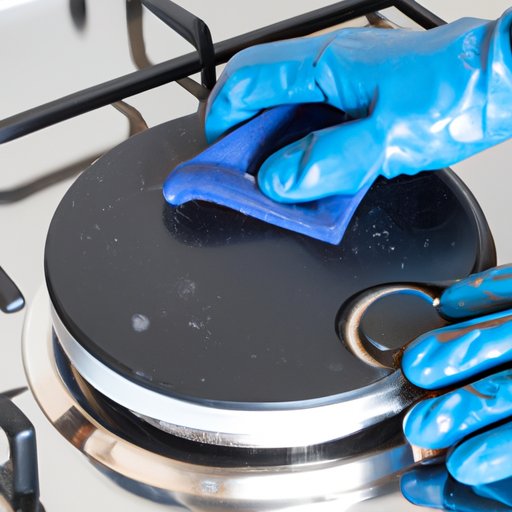
I. Introduction
Cooking is a necessary part of daily life, and for many households, a gas stovetop is the preferred cooking appliance. While gas stovetops are efficient and easy to use, they do require regular cleaning to keep them in good working order, prevent build-up, and avoid unwanted stains. However, cleaning a gas stovetop can be a trying and challenging task, especially for those who have not cleaned it in a long time or are not familiar with the right techniques. This article will provide a step-by-step guide, useful tips, and tricks for cleaning a gas stovetop and maintaining it in pristine condition.
II. A step-by-step guide for cleaning a gas stovetop
To get started, let’s gather our cleaning supplies and proceed with the steps below:
Tools and materials needed for cleaning:
- Mild dish soap
- A soft-bristle brush
- A microfiber or cotton cloth
- Hot water
- A scraper or a razor blade
- Cooktop cleaner and conditioner
Step-by-step instructions for cleaning a gas stovetop
- Turn off the stove and let it cool before cleaning.
- Remove the grates and clean them with soap and water or in the dishwasher.
- Wipe off loose debris and scraps with a clean cloth or paper towel.
- Mix a small amount of mild dish soap with hot water in a bowl or bucket.
- Scrub the cooktop with a soft-bristle brush using the soapy water, working section by section. Avoid using abrasive cleaners or scrubbers to prevent damaging the surface.
- Rinse the cooktop thoroughly with hot water and wipe it dry with a clean cloth.
- Apply a small amount of cooktop cleaner and conditioner on a clean cloth and buff the cooktop in a circular motion. Follow the manufacturer’s instructions for best results.
- Replace the grates once they are dry and your gas stovetop is sparkling clean!
III. Natural methods for cleaning a gas stovetop
Using chemical-free and natural cleaning methods can be an eco-friendly option that is also safe for your gas stovetop. Below are some natural methods you can use to clean your gas stovetop:
Vinegar and Baking Soda method:
- Make a paste of baking soda and water
- Apply the mixture to the stovetop
- Let it sit for 5-10 minutes
- Spray vinegar over the stovetop
- Wipe it away with a clean cloth
Lemon Juice method:
- Squeeze fresh lemon juice over the stovetop
- Wipe it away with a clean cloth
IV. Tips for keeping a gas stovetop from getting dirty
Prevention is better than cure! Here are some tips for keeping your gas stovetop clean and limiting build-up:
Wipe up spills immediately:
Spills from sauces or oils can turn into stubborn stains, so make an effort to wipe them up as soon as they happen. Use a wet dishcloth or paper towel and be gentle to prevent scratches.
Choose appropriate cookware:
Make sure you use clean pots and pans. Food stains and grease can quickly accumulate on an improperly washed pot or pan. Also, avoid using iron skillets or cast-iron cookery that can scratch the stovetop and leave behind marks.
Regular maintenance:
Make an effort to clean your gas stovetop regularly, ideally after each use and weekly with deep cleaning. A natural cleaner like the vinegar and baking soda mixture can be used weekly to keep on top of any mess that might be building up, and a deep clean with a specialty cleaner once a month or so.
V. Common mistakes to avoid when cleaning a gas stovetop
Mistakes can happen to the best of us. Here are some common mistakes to avoid when cleaning your gas stovetop:
Using abrasive cleaners or scrubbers:
Scouring cleaners can leave scratches and damage the stovetop surface, resulting in permanent stains. Instead, use a soft cloth or brush when cleaning.
Using too much water:
Using too much water when cleaning can get into the electrical parts of your gas stovetop and cause short circuits. Avoid this by applying water sparingly.
VI. A review of the best cleaning products for gas stovetops
While natural remedies are always good, specialized cleaners can also make cleaning your gas stovetop easier. Here are the crowd-pleasers:
1. Weiman Gas Stovetop Cleaner and Polish:
Weiman’s Gas Range Cleaner and Polish is a powerful, streak-free formula that removes grease, burns, and stains. It contains a protective coating that leaves your cooktop shinning and prevents future damage.
2. Bar Keepers Friend Cooktop Cleaner:
Bar Keepers Friend Cooktop Cleaner has a powerful, non-abrasive formula that removes tough stains, burns, and residue. It also protects the gas stovetop from future stains and greasy residues.
VII. How to troubleshoot gas stovetop cleaning challenges
Here are some solutions to cleaning challenges that you may encounter when cleaning your gas stovetop:
Burnt-on residue:
If you have stubborn residues that do not come off with regular cleaning, mix baking soda with vinegar and apply the paste to the affected areas. Let it soak for 20 minutes, scrub it with a soft brush, rinse and dry.
Discoloration:
Discoloration is often caused by prolonged exposure to heat. To remedy this, use a commercial cleaner for the stovetop’s discoloration or scorch marks. If that doesn’t work, consider replacing the stovetop.
Stains:
If you have stubborn stains that won’t come off, use a specialty cleaner. Some cleaners can remove the stain from stovetops without damaging them. However, stains that have been sitting for an extended period might be tough to remove, and you may have to consider replacing the stovetop.
VIII. Conclusion
Cleaning a gas stovetop may seem like an intimidating chore, but with these tips and tricks, it can be a quick and easy process. Prevention is key to maintaining a clean gas stovetop, but in case you encounter any cleaning challenges, this article covers the solutions and some recommendations for the best cleaning products for your stovetop.





